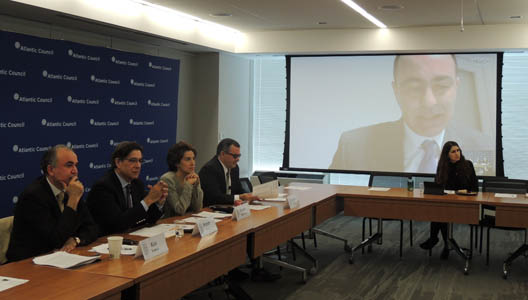
The Nexus Between Politics, Economy, and Security
Tunisians made a critical leap in solidifying the country’s path to democratic transition as they approved a new constitution based on general consensus between different parties and factions across the country. In light of these developments, the Rafik Hariri Center for the Middle East hosted a roundtable discussion on Tuesday, March 4, 2014 on “Tunisia’s Next Chapter: The Nexus Between Politics, Economy, and Security,” exploring Tunisia’s political and economic trajectories in light of mounting security concerns. Kais Darragi, the deputy chief of mission of the Tunisian Embassy in Washington, delivered opening remarks. The panel featured Haykel Ben Mahfoudh, professor at the University of Carthage and senior advisor on security sector reform expert, Mariem Malouche, founding member of the Tunisian American Young Professionals and World Bank economist, and Radwan Masmoudi, president of the Center of the Study of Islam and Democracy . Hariri Center Senior Fellow Mohsin Kahn moderated the discussion.
Mr. Darragi highlighted the country’s fragile economic situation. He welcomed the support provided by the United States but called for a “long term vision” that would involve a more strategic and coordinated approach to the provision of assistance. Darragi also advocated for a free trade agreement, saying it would serve as an important political and public diplomacy message.
Ben Mahfoudh, joining via video conference from Tunis, outlined the main security challenges, including the future of the old guard within the political sphere and reforming and re-legitimizing the internal security forces after past violations of human rights. The country’s stability is challenged externally by trafficking and refugee flows, as well as internally by the post-revolution security vacuum and the violence from political polarization.
Malouche cited several factors that have contributed to the weak economic situation, including the transitional governments not being equipped to even debate economic reforms and focusing instead on populist measures. There is a need to redefine the relationship between government and business and civil society, said Malouche, who believes that the current technocratic government has more space to implement reforms to stabilize the economy.
Providing an overview of how Tunisians reached this point in their transition, Masmoudi stressed the key role civil society organizations played in the national dialogue. He described the political challenges, including decades of mistrust between moderate political forces.
